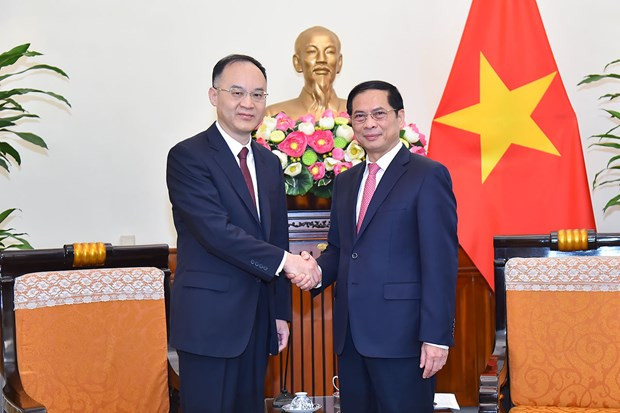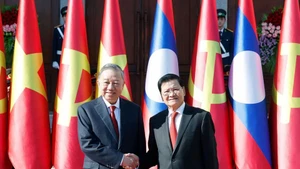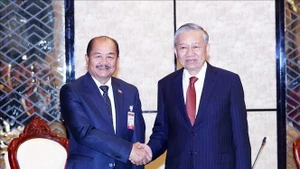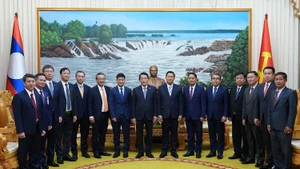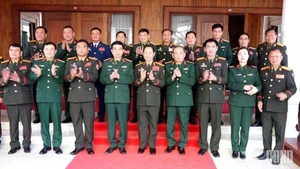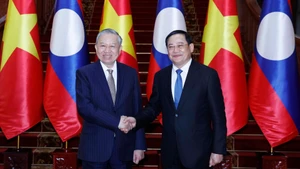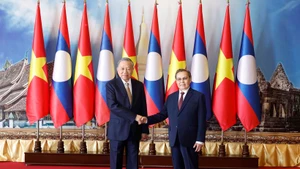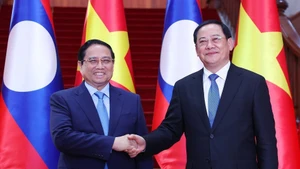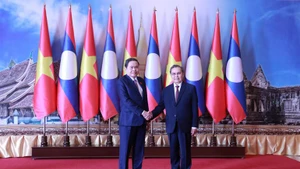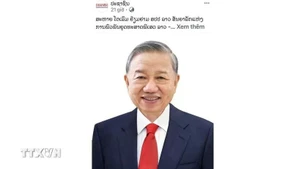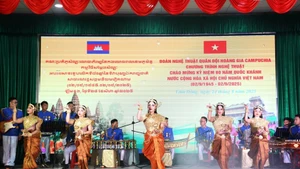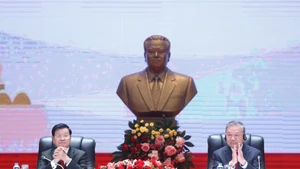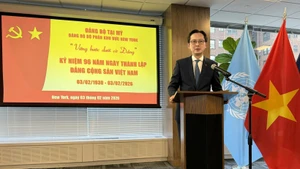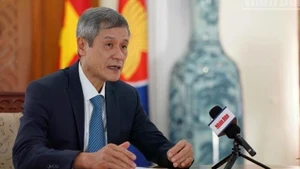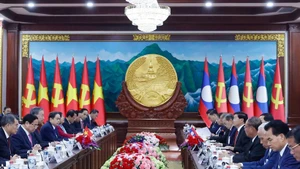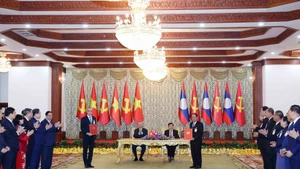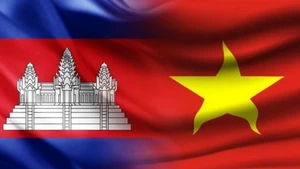Son expressed his belief that with the election of the State leadership for the new term at the ongoing first session of the 14th National People's Congress (NPC), China will successfully implement socio-economic development goals and tasks set out by the session, contributing to the realisation of the Resolution of the 20th Congress of the Communist Party of China.
The minister stated Vietnam consistently attaches importance to consolidating and developing its comprehensive strategic cooperative partnership with China, considering this a top priority in the country’s overall foreign policy of independence, self-reliance, peace, friendship, cooperation and development, and diversification and multilateralisation of external relations.
He held that the relationship between the two Parties and countries is in front of a new beginning with great advantages and huge potential for cooperation, especially after General Secretary of the Communist Party of Vietnam Nguyen Phu Trong's important visit to China in October last year.
Son suggested the two sides continue to maintain contacts and exchanges at all levels; improve the quality and efficiency of cooperation, develop trade in a more balanced and sustainable manner; expand investment cooperation in parallel with settling obstacles in several key projects; promote transport connectivity, and soon resume flights between the nations to facilitate travel of people and flows of goods, especially in the context that the two countries have opened their doors after the COVID-19 pandemic.
Applauding China’s placing of Vietnam on the list of countries to which China’s group tours will be piloted from March 15, the minister recommended the two sides facilitate the exchange of tourists, and effectively and sustainably exploit their extensive potential for tourism cooperation for mutual benefits.
Agreeing with the host’s suggestions for the promotion of the nations’ collaboration in the time to come, Nong affirmed that China treasures its relations with Vietnam and is willing to work with Vietnam to increase exchanges, consolidate political trust via all-level contacts, and constantly enhance the friendship and comprehensive strategic cooperative partnership between the two countries.
Vietnam is becoming an increasingly important cooperation partner of China, with bilateral trade turnover nearing 235 billion USD, the official said, expressing his wish that the two sides will further promote cooperation in economy, trade, investment, transport connectivity, culture, education and tourism.
He proposed Vietnam continue to create a fair and favourable business climate for Chinese businesses.
Regarding the East Sea/South China Sea issue, the two sides emphasised the importance of strictly implementing agreements and common perceptions of senior leaders of the two Parties and countries, well controlling and properly settling disagreements at sea.
Son suggested the two sides respect each other's legitimate rights and interests in accordance with international law, especially the 1982 United Nations Convention on the Law of the Sea (UNCLOS); and make efforts to maintain peace and stability at sea for the development of each country and making positive contributions to peace, stability, cooperation, and development in the region and in the world.
The same day, Standing Deputy Minister of Foreign Affairs Nguyen Minh Vu held talks with Chinese Assistant Minister of Foreign Affairs Nong Rong, during which the two sides agreed to continue fully implementing the high-level perceptions and thoroughly prepare for the 15th meeting of the Steering Committee for Vietnam-China Bilateral Cooperation and step up bilateral cooperation in different areas.
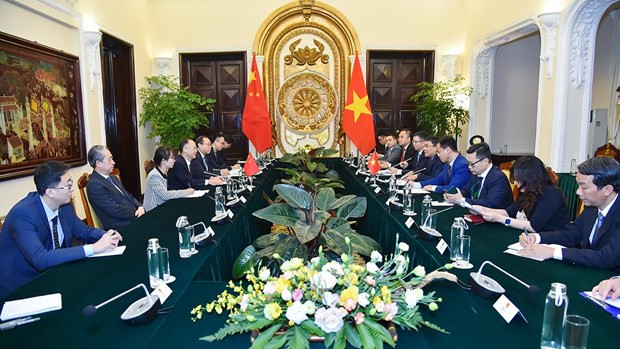 |
| At the talks between Vietnamese Standing Deputy Minister of Foreign Affairs Nguyen Minh Vu and Chinese Assistant Minister of Foreign Affairs Nong Rong. (Photo: VNA) |
Vu suggested both sides devise plans and well hold exchange activities, all-level meetings and facilitate locality-to-locality cooperation, continue applying trade facilitation measures. He proposed China accelerate the opening of its market for Vietnamese farm produce, resume seafood imports, make it easier for Vietnam to establish more trade promotion offices in the country and increase the quotas for Vietnamese goods in transit by Chinese railway to a third country.
Vu also proposed measures to boost cooperation in investment, finance, transport infrastructure connectivity, education, culture-sports.
Hailing China for adding Vietnam into the list of countries for pilot group tours from March 15, he urged the two sides to resume flights soon, well deploy group tours and recover tourism cooperation to the pre-pandemic level.
Nong, for his part, affirmed that China treasures Vietnam’s cooperation proposals and will continue expanding imports, with particular emphasis on the licensing of more Vietnamese farm produce.
China will encourage its businesses to expand investment and work closely with Vietnam’s relevant agencies to deal with issues in several cooperation projects, he said.
The Chinese official proposed both sides accelerate the disbursement of Chinese aid funds to Vietnam in the fields of health care, education and improving people's livelihoods, and continue coordination in multilateral mechanisms.
The two sides also discussed cooperation between the two Ministries of Foreign Affairs and agreed to effectively implement the agreement on enhancing cooperation between the two ministries in the new situation; maintain regular meetings between their leaders, and exchanges between departments and agencies to share experience in economic diplomacy; and support localities, businesses and people and in foreign investment attraction for development of each country.
On border and territorial issues, they agreed to continue coordination in managing and protecting the shared border in accordance with the three legal documents on the land border and related agreements; to accelerate the upgrading and opening of several pairs of border gates; build the Vietnam-China borderline of peace, stability, cooperation and development; seriously implement high-level common perceptions; well control disagreements; and maintain peace and stability at sea.
Vietnam consistently pursues the mechanism of negotiations and exchanges between the two countries regarding maritime issues, and satisfactory settlement of disagreements and disputes in the East Sea through peaceful measures in line with international law, including the 1982 United Nations Convention on the Law of the Sea (UNCLOS), Vu said.
He suggested both sides maintain regular communication to address arising issues, including providing humanitarian treatment for fishing vessels and fishermen at sea.
